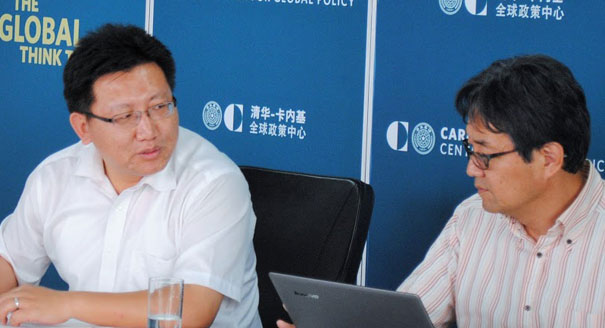Registration
You will receive an email confirming your registration.
Japanese security policy has witnessed significant changes over the last year, with the formation of a Japanese National Security Council and the adoption of several new defense and security guidelines. Tokyo’s annual defense white paper offered a reinterpretation of the country’s pacifist constitution and adjustments to policies regarding dual use and defense technologies. For many in China, these developments have reinforced the notion that Japan is seeking to contain it.
Carnegie–Tsinghua’s Zhao Kejin hosted a discussion featuring Professor Zhao Hongwei of Hosei University on the possibility of conflict between China and Japan.
Discussion Highlights
- Japanese Policy Shifts: Over recent decades, the speakers explained, Japan has not taken a leadership role in the region, despite its large economy. This makes Tokyo’s recent efforts to secure power and influence in the region a significant policy change. As Japan strives to establish itself as a leader in the Asia-Pacific Region, many of its policies have been perceived as being anti-Chinese. Some participants wondered if Japan is trying to encourage the United States to a play a more significant role in the Asia-Pacific in order to curb Chinese power.
- Determining Factors: The speakers explained that in Western countries, foreign policy is determined by national interests. In Asian countries, however, policy is highly affected by historical relationships and culture.
- Japan’s “Right of Collective Self-Defense”: Article Nine of the Japanese Constitution currently prohibits any form of warfare and bans maintenance of a military. Recently, though, Prime Minister Abe has advocated that Japan, as a sovereign nation, is entitled to the “right of collective self-defense,” a phrase that is understood to mean the ability to fight with an ally in war. The speakers asserted that a more proper translation of this phrase would in fact be Japan’s right to wage all forms of war. Abe’s efforts to repeal Article 9, coupled with recent legislation imposing strict controls on state secrets and expanding the Japanese self-defense force, has led to a growing mistrust in Sino-Japanese relations. Participants further suggested that Japan is seeking to establish an Asian version of NATO to contain China.
- Meeting at APEC: In November 2014 there is a chance for the Japanese and Chinese heads of state to discuss issues at the 2014 APEC Economic Leaders’ Summit. Participants discussed whether such a meeting could help to reduce the possibility of conflict or even, given public attitudes in both countries, whether such a meeting would take place. They added that President Xi still has many concerns ahead of a possible meeting.
- Antagonistic Neighbors: Participants agreed that tensions are not solely limited to the Senkaku/Diaoyu Island dispute and the controversy surrounding the Yasukuni Shrine. Instead, present levels of distrust originate from a perceived lack of mutual respect and violations of the Sino-Japanese Fishing Agreement. Speakers stated that a preoccupation in both countries with public perceptions of power and domestic politics could result in an unintended armed conflict.
- The Role of Non-State Actors: Participants agreed that it would be difficult for Prime Minister Abe and President Xi to work toward improving the current state of affairs between both countries. Instead, they proposed that civil society, students, and academics from each nation should strive to rebuild respect and trust. These people-to-people and Track II exchanges could help to mitigate tensions and reduce the risk of conflict. Participants highlighted the importance of these interactions, noting their ability to help build both mutual understanding and cooperation at a grass-roots level.
Zhao Kejin
Zhao Kejin is a resident scholar at the Carnegie–Tsinghua Center and deputy director of Tsinghua’s center for U.S.-China relations. An expert on U.S. government and politics, comparative politics, political marketing, and Chinese diplomatic institutions, Zhao runs a program on China’s public diplomacy.
Zhao Hongwei
Zhao Hongwei is a professor at the Hosei University Faculty of Lifelong Learning and Career Studies. He is an expert in Chinese politics and East Asian international relations. Zhao completed his PhD at the University of Tokyo’s Graduate School of Arts and Sciences.
